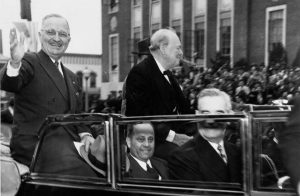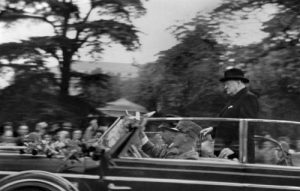
1946 - 1963: Elder Statesman
Roosevelt Memorial Fund

Winston Churchill, Parliament Square, London © Sue Lowry & Magellan PR
November 18, 1946
November 18, 1946.
I am very glad to be invited to support the Prime Minister in calling for subscriptions to the British memorial to President Roosevelt. The House of Commons would gladly have voted all the money needed but it was thought better that the Fund should be made up by small subscriptions so that very large numbers of people could have a chance to take their share. In the great republic across the Atlanticthe head of the State is also the head of a Party, in the midst of all the controversies of partisan politics. But over here, in Britain, we only knew him as a world-statesman who was a friend in need and a friend indeed to our country and to the causes of freedom and civilisation which were our cause and which were his cause.
For more than five years I worked with him in true comradeship. We sent each other, on each side, nearly a thousand long telegrams and so kept commanding unity of purpose and policy amid the innumerable perplexing problems of war, which in its intimacy and in its practical effectiveness surpassed any tale which history tells of the alliances of great nations with common aims and in equal peril.
I conceived an admiration for President Roosevelt as a statesman, a man of affairs and a war leader. I felt the utmost confidence in his upright and inspiring character and outlook and these ripened in my breast a personal regard and affection for him which will dwell with me as long as I live. His love of his own country, his respect for its constitution, his power of gauging the tides and currents of its free, mobile, public opinion were manifest. But added to these were the beatings of that generous heart which was always stirred to anger and to action by spectacles of aggression and oppression by the strong against the weak.
His physical affliction lay heavily upon him. It was a marvel that he bore up against it through all the years of Party controversy in his own country and through the years of world storm. As I said to the House of Commons not one man in ten millions, stricken and crippled as he was, would have attempted to plunge into a life of physical and mental exertion, of hard and ceaseless political strife. Not one in a generation would have succeeded in becoming undisputed master of the vast and tragic scene.

2025 International Churchill Conference
There is no doubt that the late President foresaw the dangers closing in upon the pre-war world with far more prescience than most well-informed people on either side of the Atlantic. There never was a moment’s doubt on which side his sympathies lay. The bearing of the British nation in that time of stress when we were all alone filled him and vast numbers of his countrymen with the warmest sentiments towards our people. Even while the United States was nominally neutral he advised the extraordinary measure of assistance called “Lend-Lease”, which will stand forth as the most unselfish and unsordid financial act of any country in all known history.
He was one of those men about whom one could feel that the worse things got, the better he would be. It is not for us in this island to appraise his position in American history, but we have a right to proclaim that he played a decisive part in the fortunes and the future of mankind, that he was the greatest American friend Britain has ever known and the most powerful champion of freedom who has ever brought help and comfort from the new world to the old.
Now in war-scarred London we raise a monument to his memory and to his fame. It is the heartfelt tribute of British gratitude. To the pleasant ceremonial garden, with its fountains and trees and flowers, of which the Prime Minister has spoken, in which this monument will stand, all sorts and conditions of men and women will resort and if Franklin Roosevelt’s inspiration lingers there none will take away any thought which does not arouse fearless resistance to tyranny in all its forms and which does not harmonise with the broadening hopes and higher humanities which may some day reign over all the land and sea.
Subscribe
WANT MORE?
Get the Churchill Bulletin delivered to your inbox once a month.





